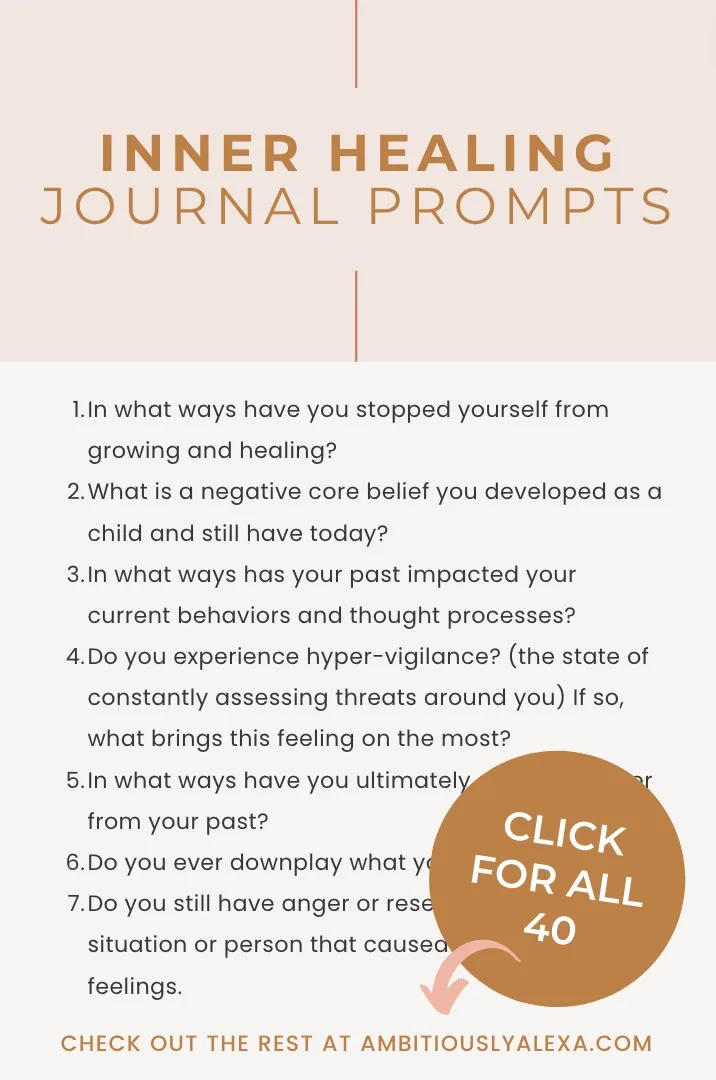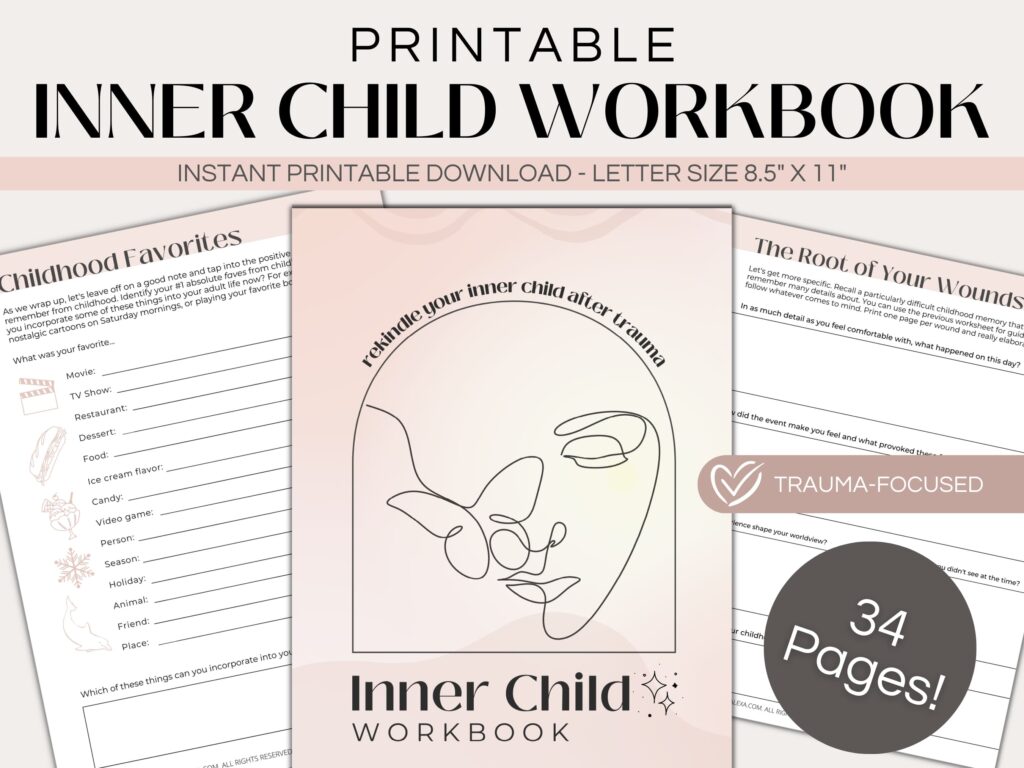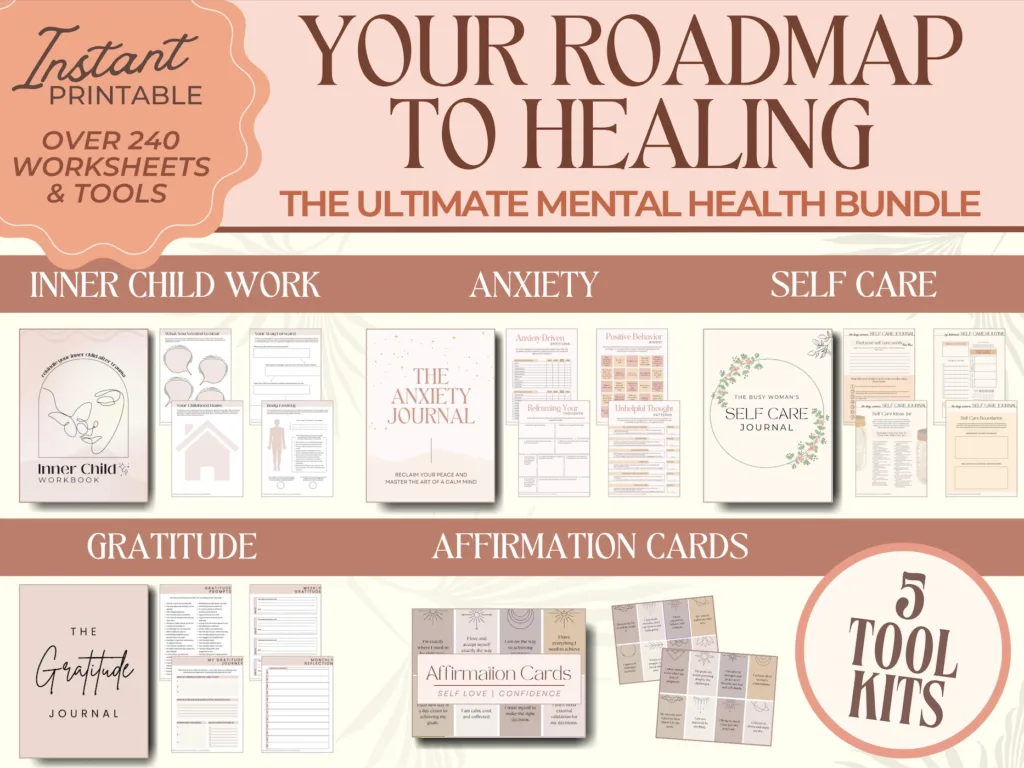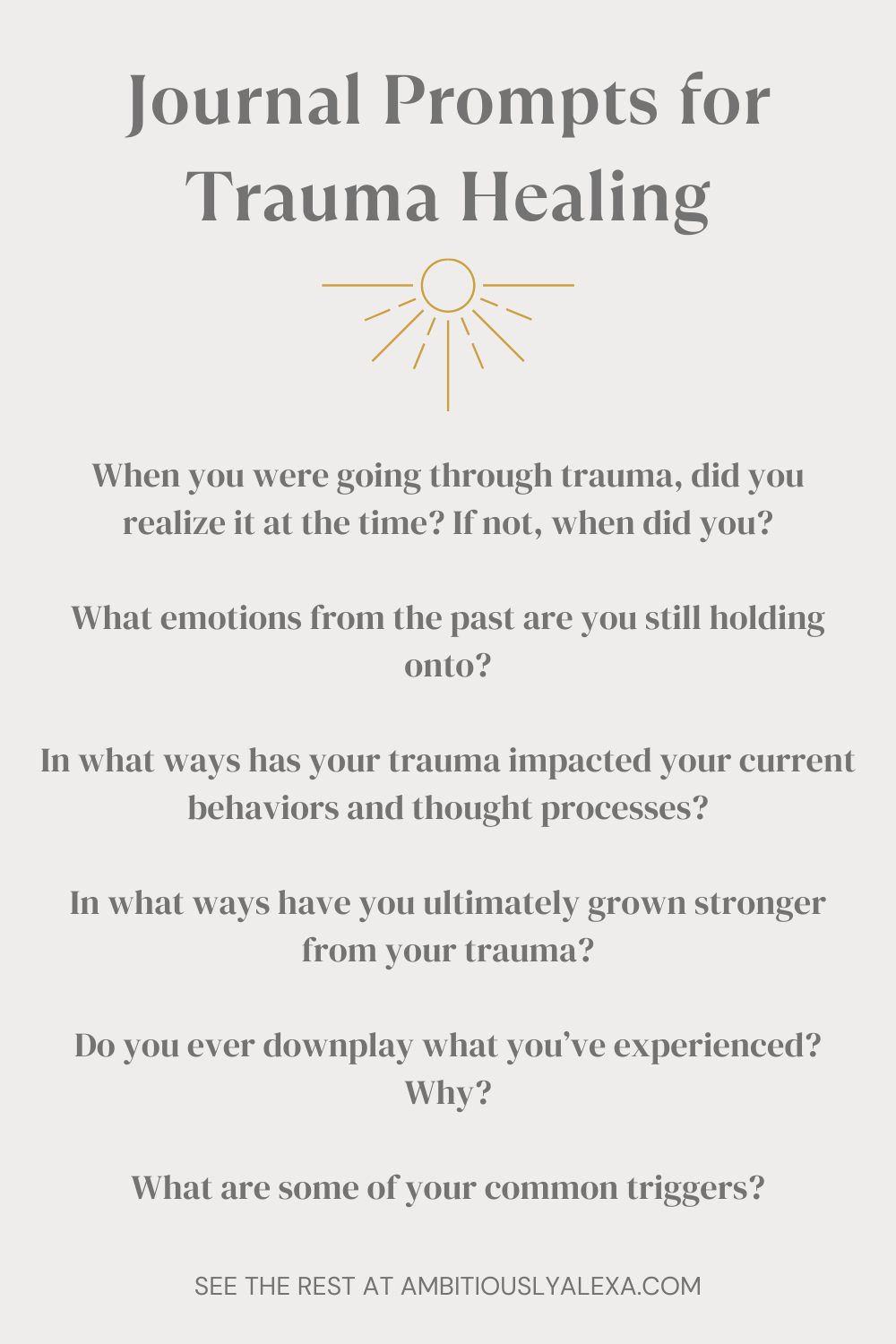40 Trauma Healing Journal Prompts to Process Your Past
Last Updated on February 20, 2024
Short on time? Here’s 3 quick journal prompts for your trauma healing:
- In what ways have you stopped yourself from growing and healing?
- What is a negative core belief you developed as a child and still have today? What evidence is there against it, showing that it’s not true?
- What are some of your common triggers?
No need to sugar coat it: healing from trauma is messy. You feel the twists and turns of repressed emotions making their way to the surface. There’s that nagging anxiety that just won’t go away, with a nervous system always on high alert.
I wish I could tell you there was a quick fix to take it all away. But processing your experiences through journaling can be your first step toward clarity.
Between being trapped in constant fight-or-flight, confusion, and frustration, you may be asking yourself…
“Where do I even start in my healing process?”
There’s no one right answer. If you’re just as lost as I was when I began healing my trauma, journaling is where things finally came together.
When you use your journal to dig deeper, you’ll slowly learn to regulate your emotions and process uncomfortable memories–ultimately guiding you to come to terms with your past.
As someone with a history of trauma myself, I’ve used a combination of journaling and therapy to understand my complex issues. I’ve learned how to recognize my triggers and reshape the negative core beliefs that formed from my trauma. And so far, after 10 years of seeking help, I finally feel like I’m making leeway. And you can too.
40 Trauma Healing Journal Prompts
Don’t forget about these essential prompts! Pin ’em to come back later!

Journal Prompts to Process & Heal From Your Past
- In what ways have you stopped yourself from growing and healing?
- When you were going through trauma, did you realize it at the time? If not, when did you?
- What emotions from the past are you still holding onto?
- In what ways has your trauma impacted your current behaviors and thought processes?
- Do you experience hyper-vigilance? (the state of constantly assessing threats around you) If so, what brings this feeling on the most?
- In what ways have you ultimately grown stronger from your trauma?
- Do you ever downplay what you’ve experienced? Why?
- Do you still have anger or resentment toward the situation or person that caused your trauma? Explain your feelings.
- In what ways have you moved forward or made progress away from your trauma?
- How do you deal with tough memories, emotions, thoughts, or behaviors?
- Do you have any self care activities in place?
- When interacting with others, do you tend to overshare or stay very private?
- Do you experience nightmares? How frequently? Note any common or recurring themes.
RELATED: 72 Trauma Affirmations to Support Your Healing Journey
Journal Prompts for Childhood Trauma
Rather than being tied back to a single event, childhood trauma usually comes from a chronic series of adverse childhood experiences (ACEs). This commonly manifests into complex PTSD (CPTSD). These prompts will help you assess every aspect of your childhood, allowing a closer look at how your childhood translates into your adult behaviors.
- Do you think your childhood trauma is holding you back from living a fulfilling life?
- Are you able to honor yourself and what you’ve been through, recognizing that it does not define you?
- How can you show yourself more kindness, understanding, and compassion?
- In which ways do you still have healing to do?
- What is a negative core belief you developed as a child and still have today? What evidence is there against it, showing that it’s not true?
- What are some ways you can express self love and be gentle to yourself through the healing process?
- What are 5 things, people, or places that make you feel safe?
- How have you persevered despite the trauma you faced?
- What is the number one trauma response you’re working on and what steps are you taking to work on it?
- What was your greatest fear as a child?
- What was your greatest fear as a teenager? (you might love these exercises for healing your inner teenager)
- What is/was your greatest fear as a young adult?
- How would you describe your childhood?
- Was your childhood home unstable? How so?
- Describe your relationship with each of your parents. Has their influence impacted you in negative ways?
- Something I wish my family understood about me is ______.
- What triggers my fight or flight response the most?
- What support did you need growing up that you felt you didn’t receive?
RELATED: 80 Insightful Inner Child Journal Prompts to Self-Heal
The #1 most overlooked part of trauma healing: your inner child
This guided journal helps you tackle the real roots of trauma, so you can learn from your past and truly thrive.

Feeling out of touch with your inner child? Been through a traumatic experience? My printable inner child journal PDF can help you give your inner child the love they deserve but didn’t get.
This workbook will help you:
Journal Prompts to Identify Your Triggers
- What are some of your common triggers?
- How do you feel when triggered? Describe this in detail.
- What can you do to better cope when something triggers you?
- Is there anything you grieve from your childhood?
- How can you accommodate yourself in your adult life to make the effects of your trauma easier?
- When do you feel most at peace?
- What are you in control of in this moment?
- What do you need to forgive yourself for?
- Have you ever gone to therapy? What do you most need out of a therapy session?
RELATED: 30+ Inner Child Worksheets for Healing and Happiness
Does journaling help with trauma?
Journaling can help tremendously with trauma, and you’d be surprised by the impact!
The first study ever conducted on the impact of journaling and mental health was in 1986, and since then over 200 research studies have shown us time and time again that journaling for emotional healing truly helps.
Through the power of a regular writing practice, you can improve your overall mental (and even physical) well-being–two areas significantly impacted by trauma.
Benefits of trauma journaling for emotional healing
In 2019, there was a study that specifically looked at the impact of journaling on trauma healing. After six weeks of writing, people saw improvements in…
- Increased resilience
- Less depressive symptoms
- Decreased perceived stress
- Less frequent rumination
These results were from people who reported trauma in their lives in the last year. It’s very promising to see results like these from people who are actively experiencing trauma.
So yes, absolutely, journaling can help you make sense of the complex memories, thoughts, and emotions surrounding past trauma.
With benefits like these, journaling is something you don’t want to overlook as a tool in your healing process!
How do you start journaling for trauma?
You can start with a simple blank notebook, or even a guided journal with healing prompts already put together for you. The choice is yours! Consider the amount of guidance you could use in reflecting on your past trauma and how familiar you are with journaling in general.
For the best guidance in this, I have a trauma-informed inner child workbook you should absolutely check out. It’ll help you process and answer the tough trauma healing questions that stand in your way of moving forward!
Steps to take when tackling trauma through journaling
- Start small – Start your journey from where you’re at right now. Don’t worry if you’re far from where you want to be. Accepting yourself as you are is a crucial step in self love.
- Let the writing be your guide – Follow your writing wherever it wants to take you. It’s likely bringing up certain memories and thoughts for a reason. Let your words flow without any judgment.
- Don’t rush your journal entries. – Take the time to carefully consider what’s on your mind and how you feel. Allot yourself at least 20-30 minutes to journal.
- Unpack past events – see if you can connect the dots to how past trauma shows up in your life, behaviors, and thought patterns today.
- Your goal? Self-discovery. – Enter your journal with an open mind and an eagerness to learn more about yourself. Take note of any new findings you discover about your reactions and coping mechanisms.
- Tune into your mind after you close your journal – new triggers and realizations may come up throughout the day, after your journaling session. This is absolutely normal, and actually benefits you and your healing process! I encourage you to take notes on what you notice.
Psst…we could all use a little self care to help in our trauma journey. Grab my (free!) self care daily check in sheet below! A super easy way to incorporate a little journaling into your routine each morning and night.
Let this self-reflection be your next step toward inner peace
As much as we wish we could heal trauma overnight, there’s simply too much to unpack. Don’t let this discourage you, though! You’ve made an amazing first step in your healing journey simply by reading this. Go you, seeking out the self-support tools you need!
Rest assured: little by little, you will be able to unlearn the negative habits and thought patterns your trauma caused you. There is only hope from here.
If you want to uncover more about yourself and your trauma, I highly recommend grabbing my inner child workbook. Not only will you find out the “why” and the psychology behind your trauma, but you’ll learn how to regulate your emotions after a dysfunctional childhood.
Let me know in the comments:
Which of these prompts made you discover something you’ve never analyzed before?
Stop waiting, let this bundle be your sign to take action and start healing for real!

Grab my bundle with 5 top-selling toolkits that make the real work happen in your healing journey.
Start your roadmap to healing today with the…
IF YOU LIKED THIS POST, YOU’LL LOVE THESE TOO!
20+ Inner Child Activities to Heal and Feel Alive
30+ Inner Child Worksheets for Healing and Happiness
75 Inner Child Affirmations to Heal Yourself From Within
80 Healing Inner Child Quotes to Feel Validated
52 Journal Prompts for Self Love to Empower Yourself
Your Inner Teenager Needs Healing Too: 16 Proven Exercise To Do So
Did ya enjoy these journal prompts? Pin this post to refer back to them whenever you need!









